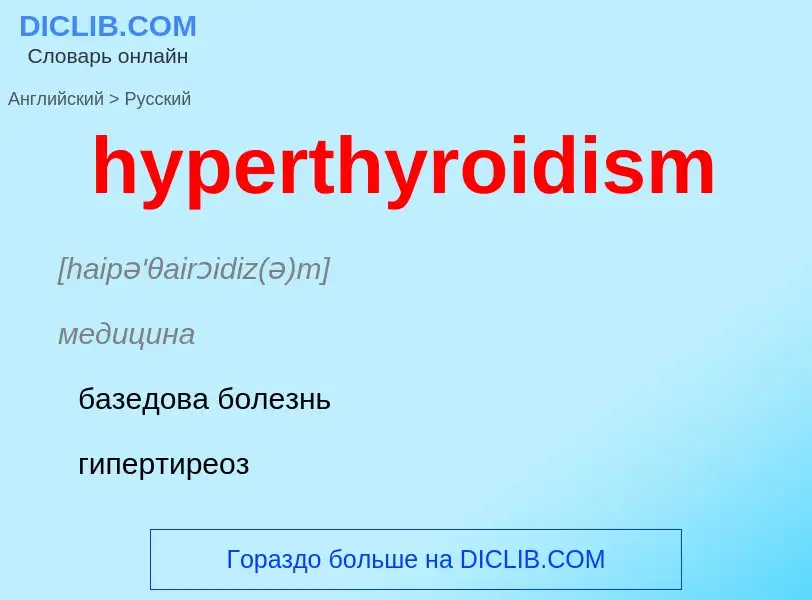Übersetzung und Analyse von Wörtern durch künstliche Intelligenz ChatGPT
Auf dieser Seite erhalten Sie eine detaillierte Analyse eines Wortes oder einer Phrase mithilfe der besten heute verfügbaren Technologie der künstlichen Intelligenz:
- wie das Wort verwendet wird
- Häufigkeit der Nutzung
- es wird häufiger in mündlicher oder schriftlicher Rede verwendet
- Wortübersetzungsoptionen
- Anwendungsbeispiele (mehrere Phrasen mit Übersetzung)
- Etymologie
hyperthyroidism - Übersetzung nach russisch
[haipə'θairɔidiz(ə)m]
медицина
базедова болезнь
гипертиреоз
гипертиреоидизм
гипертиреоидоз
базедовифицированный зоб
зоб диффузный тиреотоксический (диффузный токсический)
экзофтальмический зоб
существительное
медицина
гипертиреоз
[haipə'θairɔid]
прилагательное
общая лексика
эмоциональный
невыдержанный
физиология
относящийся к гипертиреозу
существительное
[haipə'θairɔid]
физиология
щитовидная железа
обладающая повышенной секрецией
медицина
больной
страдающий гипертиреозом
медицина
базедова болезнь
базедовифицированный зоб
зоб диффузный тиреотоксический (диффузный токсический)
экзофтальмический зоб
тиреотоксикоз
тиротоксикоз
Definition
Wikipedia
Hyperthyroidism is the condition that occurs due to excessive production of thyroid hormones by the thyroid gland. Thyrotoxicosis is the condition that occurs due to excessive thyroid hormone of any cause and therefore includes hyperthyroidism. Some, however, use the terms interchangeably. Signs and symptoms vary between people and may include irritability, muscle weakness, sleeping problems, a fast heartbeat, heat intolerance, diarrhea, enlargement of the thyroid, hand tremor, and weight loss. Symptoms are typically less severe in the elderly and during pregnancy. An uncommon complication is thyroid storm in which an event such as an infection results in worsening symptoms such as confusion and a high temperature and often results in death. The opposite is hypothyroidism, when the thyroid gland does not make enough thyroid hormone.
Graves' disease is the cause of about 50% to 80% of the cases of hyperthyroidism in the United States. Other causes include multinodular goiter, toxic adenoma, inflammation of the thyroid, eating too much iodine, and too much synthetic thyroid hormone. A less common cause is a pituitary adenoma. The diagnosis may be suspected based on signs and symptoms and then confirmed with blood tests. Typically blood tests show a low thyroid stimulating hormone (TSH) and raised T3 or T4. Radioiodine uptake by the thyroid, thyroid scan, and TSI antibodies may help determine the cause.
Treatment depends partly on the cause and severity of disease. There are three main treatment options: radioiodine therapy, medications, and thyroid surgery. Radioiodine therapy involves taking iodine-131 by mouth which is then concentrated in and destroys the thyroid over weeks to months. The resulting hypothyroidism is treated with synthetic thyroid hormone. Medications such as beta blockers may control the symptoms, and anti-thyroid medications such as methimazole may temporarily help people while other treatments are having an effect. Surgery to remove the thyroid is another option. This may be used in those with very large thyroids or when cancer is a concern. In the United States hyperthyroidism affects about 1.2% of the population. It occurs between two and ten times more often in women. Onset is commonly between 20 and 50 years of age. Overall the disease is more common in those over the age of 60 years.



.jpg?width=200)
.jpg?width=200)
.jpg?width=200)
